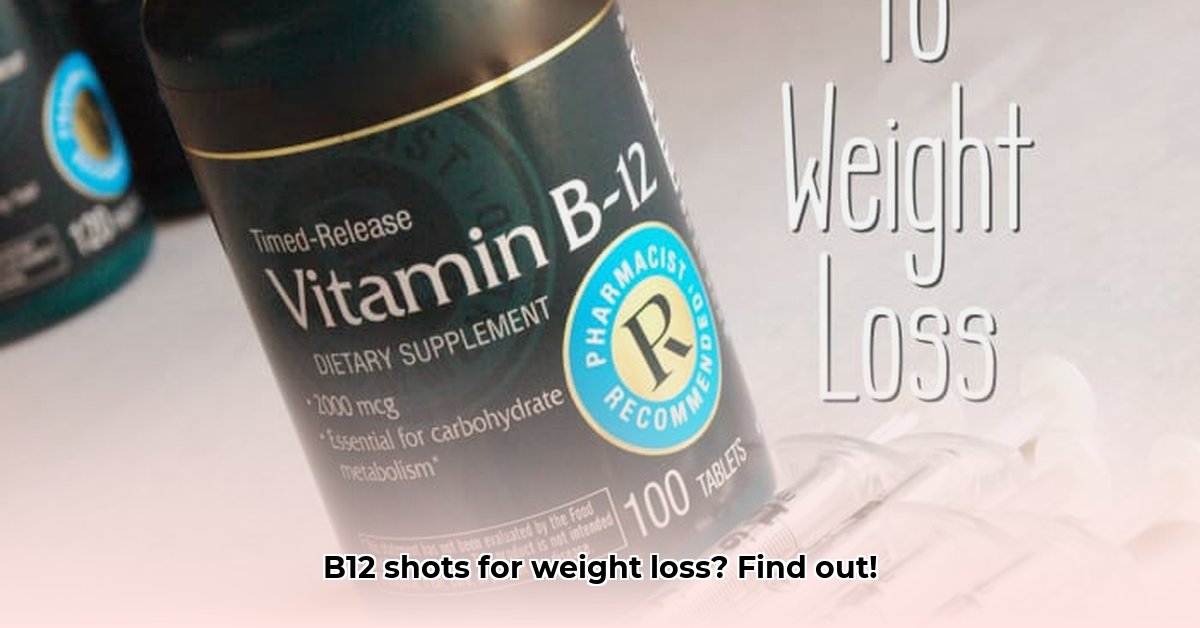
Understanding Lipotropic Injections: What Are They?
Lipotropic injections are a combination of vitamins, primarily B12, and amino acids (the building blocks of protein). Clinics often market them as metabolism boosters, claiming they enhance fat burning. However, the reality is more complex. These injections might offer a minor contribution to a comprehensive weight-loss strategy, but they aren't a standalone solution. Weight loss is a multifaceted process influenced by numerous factors beyond simple nutrient supplementation.
The Weight-Loss Claims: Separating Fact from Fiction
Many providers aggressively promote B12 shots and lipotropics as miracle weight-loss solutions, often showcasing dramatic (and frequently exaggerated) results. While some individuals report weight loss following these injections, other contributing factors are highly likely. People often adopt improved diets and exercise routines concurrently, making it difficult to isolate the injections' sole impact. Attributing weight loss solely to the injections without considering these lifestyle changes is inaccurate.
What Does the Research Actually Say?
Rigorous scientific studies definitively proving the effectiveness of these injections for weight loss are scarce. Existing research is often hampered by small sample sizes, inadequate control groups (making comparisons difficult), and lack of publication in reputable journals. This makes it challenging to draw solid conclusions about their impact on weight loss. More extensive, well-designed research is needed before definitive statements can be made.
"The current evidence simply doesn't support the claim that these injections significantly contribute to weight loss independent of lifestyle changes," says Dr. Emily Carter, a registered dietitian and weight-loss specialist at the Mayo Clinic.
Safety Concerns and FDA Regulation
Critically, the U.S. Food and Drug Administration (FDA) doesn't regulate these injections as strictly as prescription medications. This means less oversight regarding ingredient purity, dosage consistency, and potential side effects. This lack of regulation is a significant concern.
Weighing the Pros and Cons
Let's summarize the potential benefits and drawbacks:
Potential Benefits (Limited Evidence, Often Concurrently with Lifestyle Changes):
- Possible slight energy increase: Some individuals report increased energy levels, potentially improving exercise adherence. This effect is not guaranteed and may be due to placebo effect.
- Improved nutrient levels: Addressing a B12 deficiency could indirectly improve overall health; however, this isn't directly linked to significant weight loss.
Potential Drawbacks:
- Lack of robust scientific evidence: Current research doesn't strongly support significant weight loss from these injections alone.
- Potential side effects: Injection-site pain, redness, or allergic reactions are possible.
- Cost: Lipotropic injections can be expensive.
- Lack of FDA regulation: This raises safety and consistency concerns.
- Misleading marketing: Exaggerated marketing creates unrealistic expectations.
How Safe Are Lipotropic Injections for Long-Term Weight Loss?
The long-term safety profile of lipotropic injections remains largely unclear due to limited research and inconsistent regulation. While some users report short-term benefits, the absence of extensive, well-conducted studies prevents us from fully understanding potential long-term risks.
"The lack of rigorous, long-term studies is a major concern," notes Dr. David Lee, MD, a physician specializing in obesity management at Stanford University. "We simply don't know the potential long-term consequences of regular lipotropic injections."
The Verdict: Informed Choices for Weight Loss
B12 shots and lipotropics lack substantial evidence supporting their use as a primary weight loss method. Weight loss is complex, and any observed weight reduction is likely due to healthier diet and increased physical activity.
Before considering these injections, consult your doctor or registered dietitian. They can assess your individual needs, discuss potential risks and benefits, and create a personalized, evidence-based weight-loss plan. Sustainable weight loss is a journey built on long-term healthy habits, not a quick fix.
Key Takeaways:
- Lipotropic injections lack strong scientific evidence supporting their efficacy for weight loss.
- While anecdotal evidence exists, rigorous clinical trials are lacking.
- Long-term safety remains largely unknown due to limited research and regulation.
- Lifestyle changes (diet and exercise) are essential for sustainable weight loss.
- Consult your doctor before starting any weight loss regimen.